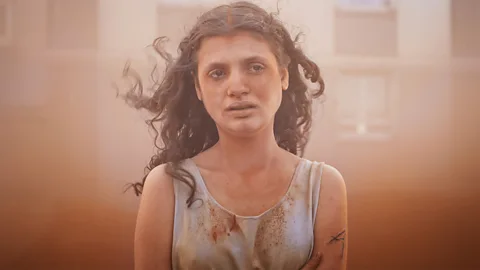Alpha review: This outlandish horror about an Aids-like epidemic is a 'disorientating, maddening whirlwind'
 Courtesy of Cannes Film Festival
Courtesy of Cannes Film FestivalAfter winning the Palme d'Or for the shocking Titane, out-there French director Julia Ducournau is back at Cannes with another nightmarishly weird film – but it's an unsatisfying watch.
One of the most anticipated titles at this year's Cannes Film Festival was Alpha, written and directed by Julia Ducournau. Her last film, the magnificently bonkers Titane, won the Palme d'Or in 2021, so the news that she was returning to Cannes with another fizzing cocktail of icky body horror and traumatic family relationships had festival-goers excited – if nervous – to see what nightmarish weirdness Ducournau had in store.
It turns out that there is nightmarish weirdness aplenty. A disorientating, maddening whirlwind of haunting sights, thunderous music and fiercely intense performances, Alpha confirms that Ducournau is a visionary artist. But once you've recovered from the brain-bashing experience of watching her latest film, it comes to seem a lot less satisfying and stimulating than Titane was.
Alpha gets its title from its heroine (Mélissa Boros), a 13-year-old girl who lives in an unnamed French town with her single mother (Golshifteh Farahani). She isn't especially rebellious, but one night she comes home from a party with a large capital letter A carved into her arm by a needle the size of a chopstick. Her mother, a doctor, is understandably upset, especially as the amateurish tattoo might have given Alpha a mysterious virus that turns people to stone. As the months pass, patches of their skin harden, they cough clouds of dust, and eventually they atrophy into cadavers made of polished, cracked, creamy white marble. It's a creepy death, but also a strangely beautiful one: in effect, the deceased are transformed into their own gleaming, cathedral-worthy memorial statues.
While the doctor diligently looks after patients with this virus in her spookily understaffed hospital, Alpha's tattoo won't stop gushing blood, an embarrassing affliction that prompts her classmates to shun her. (This is presented as a despicable example of prejudice, but, really, don't the children have a point?) But the doctor doesn't just have her daughter and her patients to worry about. One person who definitely has the virus is her estranged brother Amin (Tahar Rahim), a mischievous and charismatic drug addict.
Some scenes near the beginning of Alpha promise that it will be Ducournau's version of a zombie apocalypse thriller. Paranoia rises to hysteria at the hospital, where a security guard struggles to keep the infected outside, and at the school, where students flee as a swimming pool is dyed red with Alpha's blood. Set in a rundown alternate reality, in which the harsh light and muted colours suggest that the end is nigh, the film has sequences reminiscent of everything from 28 Days Later to World War Z, but Ducournau gives them their own uniquely unsettling, poetic atmosphere.
The disappointing part is that, ultimately, she does so little with the turning-to-stone disease. Flitting between two time periods (you have to keep a close eye on Farahani's haircut to tell which is which), the film unfolds in the 1980s and the 90s. The virus is associated with gay people and shared needles. And the people who have the virus, or who are suspected of having it, are treated with homophobia and ignorance. In short, the scenario is an analogy for the Aids epidemic, as Ducournau has acknowledged.
Alpha
Director: Julia Ducournau
Cast: Mélissa Boros, Golshifteh Farahani, Tahar Rahim, Emma Mackey
Run-time: 2hr 8m
There is nothing wrong with that, per se. Films often use fictional illnesses to comment on real ones. The issue with Alpha is that the fictional illness doesn't shed any new light on its non-fictional counterpart, nor does it expand upon it to build a more resonant and universal myth. The metaphor isn't a rich one. The virus is Aids by another name, and that's about it. Indeed, for much of the running time, the film drifts away from the magic-realist aspects of the condition altogether, which is a waste of such a fabulously conceived and executed visual effect. The characters seem to forget that they're turning to stone, no one ever discusses the virus's origins or potential cure, and the overcrowding and panic it caused at the hospital just evaporate. What we're left with is an intimate drama about three family members who are rocked by addiction and illness.
This raises the niggling question of why Ducournau bothered with the film's science-fiction elements at all. If Alpha is essentially a film about a doctor tending to her addict brother, and the teenage girl caught between them, why disguise it with magic realism? In an early scene, Alpha's teacher reads out Edgar Allen Poe's poem, A Dream Within a Dream, and soon afterwards, Terry Gilliam's fantastical The Adventures of Baron Munchausen is shown on television, so Ducournau gives us fair warning that her own narrative shouldn't be taken literally. But she seems oddly unwilling to commit either to the fantasy or the reality, which is why, for all of the sound and fury of its hallucinatory imagery, it doesn't signify all that much. The muddled story of Amin's addiction is short of insight and plausible detail, and yet the spine-tingling story of the supernatural epidemic is skated over, too.
Ducournau has jumped between different genres within her work before, but Alpha might have been more powerful if she had stuck to one. Considering that she has been rightly celebrated for her fearless choices, it feels slightly cowardly that she didn't attempt a film about Aids without any outlandish horror trappings wrapped around it.
★★☆☆☆
--
If you liked this story, sign up for The Essential List newsletter – a handpicked selection of features, videos and can't-miss news, delivered to your inbox twice a week.
